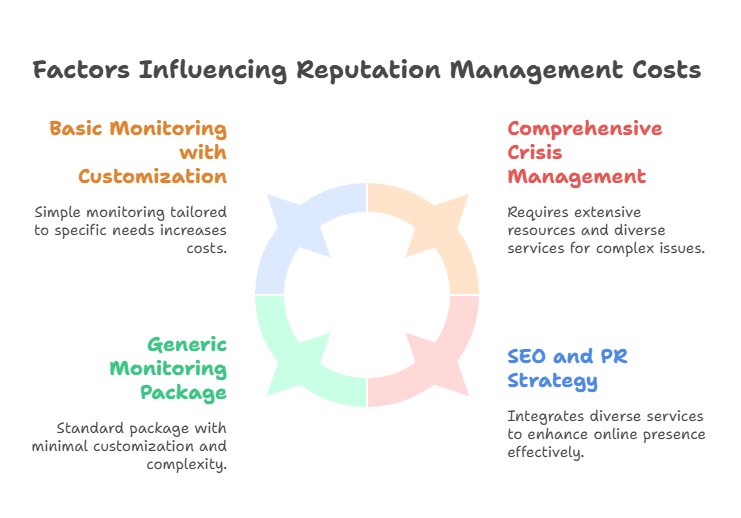Reputation management services can cost between $500 and $20,000 or more per month, depending on various factors such as the size of the business, complexity and severity of the reputation issues, the scope of services required, the industry and the geographic reach of the services.

Small businesses and individuals might expect to pay between $500 and $3,000 monthly for basic services, while mid-sized companies could see costs ranging from $3,000 to $8,000 per month for more comprehensive management. Large corporations and high-profile individuals often face the highest costs, typically between $5,000 and $20,000 or more per month, due to the complexity and scale of their online presence.
Top 5 Factors Influencing Reputation Management Pricing
Here are the top 5 most common factors affecting the cost of reputation management:

- Scope of Services: The range of services, from basic monitoring to comprehensive strategies including SEO, PR, and crisis management, directly impacts costs.
- Complexity of the Project: More intricate issues like widespread negative content or crisis management require more resources, thus increasing expenses.
- Reputation Status: The current state of your online reputation dictates the effort needed for repair or maintenance; a damaged reputation requires more intensive intervention.
- Customization: Tailored solutions for specific needs or industries often come at a higher price than generic packages.
- Service Provider’s Reputation and Expertise: Higher fees can be associated with agencies that have a strong reputation, specialized knowledge, or proven results.
Other factors include the geographic location of the service provider which affects operational costs, the duration of engagement where long-term commitments might offer discounts, and the involvement of legal or PR services which can be costly. The scale of the online presence also plays a role; larger digital footprints need more monitoring and management.
Additionally, the need for crisis management, review management, advanced SEO, international reputation handling, and the use of sophisticated data analytics all contribute to the overall cost of reputation management by increasing the demand for specialized skills, technology, and strategic planning.
Overview of Common Pricing Models
Let’s dive into the common pricing models for reputation management services, which can vary greatly based on the specific components you need for your business.
- Flat Monthly Fees: Some reputation management firms charge a flat monthly fee for their services. This is a simple model where you pay a set amount each month, regardless of the specific services rendered. However, this model mightn’t account for the varying levels of work required from month to month.
- Variable Pricing: This pricing model is based on specific service components. Essentially, pricing varies depending on the tasks performed. For instance, crisis management, content creation, and ongoing monitoring may all have different costs.
- Project-Based Pricing: In this model, the reputation management firm charges for a specific project. For example, a business might pay a set amount for a campaign to improve online reviews.
One-Time vs. Ongoing Costs
The costs associated with reputation management can be categorized into one-time and ongoing expenses, each serving different purposes and influenced by various factors:
One-Time Costs:
- Content Removal or Deindexing: This involves paying for the removal or deindexing of negative content from search engines. Costs can range from a one-time fee of around $5,000 for simpler cases like removing a single negative page to much higher depending on the complexity and the prominence of the content. For instance, removing content from high-authority sites might cost significantly more, potentially up to $30,000 for more complex cases.
- Specific Issue Resolution: If you’re dealing with a particular negative incident, like a damaging article or a series of negative reviews, one-time projects can be tailored to address this specific issue. The cost might be fixed, ranging from $5,000 to $30,000, varying based on the severity, resources needed, and the expertise involved.
- Setup and Initial Campaign: The initial phase of reputation management often includes a setup cost for strategy development, analysis, and campaign initiation. This can involve a one-time fee, with costs influenced by the scope of the project, the reputation of the provider, and the level of customization required. For example, a basic setup might start from $3,000, while more complex situations could escalate to $15,000 or more.
Ongoing Costs:
- Monthly Monitoring and Management: For continuous reputation management, businesses might opt for a monthly fee structure. Basic plans might start from as low as $500 per month for small businesses or individuals, with costs scaling up to $10,000 or more for larger corporations requiring extensive services like SEO, content management, and active review handling. The price can vary based on the business size, the number of locations, and the complexity of the campaign.
- Long-Term Maintenance: After initial improvements, ongoing maintenance is necessary to keep the reputation positive. This involves regular monitoring, review management, and content creation to maintain or enhance search engine results. Costs here can range from $200 to $10,000 per month or higher, depending on the service level and the specific needs of the client.
- Subscription Models: Some providers offer subscription services combining ongoing monitoring with periodic audits and updates, providing a balance between cost and comprehensive service. This might include tiered pricing where costs depend on the depth of service, from basic monitoring to comprehensive reputation enhancement strategies.
- Contract Length and Commitment: Longer-term contracts might offer savings compared to month-to-month services. The length of the commitment impacts pricing, with some providers offering discounts for extended periods.
Return on Investment (ROI)
Calculating the Return on Investment (ROI) for reputation management services involves looking at both tangible and intangible benefits against the costs incurred. Here’s how you can approach this calculation:
Costs:
- One-Time Costs: Initial setup, content removal, or deindexing fees.
- Ongoing Costs: Monthly or annual fees for monitoring, management, PR services, etc.
Benefits:
To quantify the benefits, we need to consider:
- Avoided Revenue Loss: Negative online sentiment can lead to loss of customers or sales. Studies suggest businesses can lose up to 22% of business with one negative article on the first page of search results.
- Brand Value Protection: This is harder to quantify but crucial. A positive reputation can enhance brand equity, leading to higher customer loyalty and potentially higher brand valuation.
- Customer Trust: Maintaining or rebuilding trust can lead to repeat business and positive word-of-mouth, both of which have indirect financial benefits.
- Lead Generation and Conversion Rates: Positive online presence can improve SEO rankings, attracting more traffic and potentially higher conversion rates.
Example Calculation:
- Total Costs (C): $50,000 (This could include $30,000 one-time for content removal and $20,000 for a year of ongoing management)
- Financial Gain (G):
- Avoided Loss: $220,000 (from preventing 22% loss on $1,000,000 revenue)
- Increased Revenue: $50,000 (5% increase on $1,000,000 revenue)
- Total Gain: $220,000 + $50,000 = $270,000
- ROI Calculation:
ROI = ((270,000−50,000) / 50,000)×100% = (220,000/50,000)×100% = 440%
This calculation suggests an ROI of 440%, indicating that for every dollar spent on reputation management, there’s a return of $4.40 in protected or increased revenue. However, remember:
- This is a simplified example. Real-world ROI might include more nuanced benefits like long-term brand loyalty or less tangible aspects like employee morale or investor confidence.
- The figures for avoided loss and increased revenue are hypothetical and should be adjusted based on actual data or industry benchmarks.
- The calculation should be revisited periodically as costs and benefits might change over time.
When using this ROI, also consider qualitative benefits which, while harder to quantify, are equally important for holistic decision-making.
Reputation Management Services Explained
Let’s break down the main services offered in reputation management. These include monitoring and alert systems, review management and response services, and SEO strategies.
Understanding each of these services is key to comprehending how they help to maintain or enhance your online presence.
Monitoring and Alert Systems
Monitoring and alert systems play a crucial role by continuously scanning the web and social media for any mentions of your brand or individual name. These systems are essential for reputation management works and are offered by online reputation management firms. They provide continuous monitoring and send alerts when your brand is mentioned, offering you the opportunity to respond promptly to any potential issues.

The average cost of these online reputation management services can vary greatly. Here are three factors that can influence the cost:
- The frequency of monitoring: The more often the web is scanned, the higher the price.
- The complexity of alerts system: Advanced systems that provide real-time alerts and detailed reports can be more expensive.
- The size and scope of your online presence: Larger brands with a broad online presence may require more extensive monitoring, which increases the cost.
Regardless of the cost, investing in reputation monitoring is a wise move for safeguarding your brand’s online reputation.
Review Management and Response Services
Managing and responding to online reviews is a critical aspect of reputation management services. Agencies engage with feedback on platforms like Google and Yelp to protect and enhance your brand’s image. Online reputation management agencies employ strategic review management to encourage positive reviews and respond professionally to negative feedback, mitigating its reputation impact.

These agencies monitor online reviews meticulously, ensuring every piece of feedback receives a professional response. Negative feedback, although potentially damaging, is viewed as an opportunity for improvement. By addressing criticism promptly and professionally, you show that you value customer input and are committed to resolving issues.
On the other hand, positive reviews are a gold mine for your brand. Not only do they improve your online reputation, but they also attract new customers. Agencies can help you promote these reviews, leveraging their positive impact for your brand’s benefit.
SEO Strategies for Reputation Management
While handling online reviews is a key aspect of reputation management, another effective strategy to protect and enhance your brand’s image is through search engine optimization (SEO). SEO strategies can significantly influence the visibility of your brand in search engine results. This, in turn, plays a crucial role in shaping public perception of your brand.

Boost Positive Content:
One of the primary goals of online reputation management is to promote positive content about your business. SEO strategies can significantly enhance the visibility of this positive content, pushing it higher up in search engine results.
Suppress Negative Content:
Simultaneously, SEO can help suppress negative content. By promoting positive content and keywords associated with your brand, negative content gets pushed lower in the search engine results where it’s less likely to be seen.
Advanced Reputation Management Techniques
Now, let’s tackle the topic of advanced reputation management techniques. You’ll learn about crisis management and media relations, the role of legal strategies in content removal, and the importance of personal branding and networking.
These are key strategies that can help safeguard your brand in the face of complex reputation issues.
Crisis Management and Media Relations
In the throes of a reputation crisis, your best allies are strategic planning and effective communication, especially when it comes to dealing with the media. Your corporate reputation management campaign should focus on mitigating reputation issues and addressing negative online reviews promptly and professionally.

Your reputation depends on how well you handle crisis management and maintain strong media relations. This is because media outlets have the power to shape public opinion about your reputation problem. Therefore, it’s essential to have a robust plan to respond to any crisis that may affect your reputation goals.
Here are three key strategies:
- Develop a Crisis Plan:
This should outline how to respond to various crisis scenarios, with clear steps to take and communication channels to use. - Maintain Strong Media Relations:
Building good relationships with the media can ensure your side of the story is heard and understood. - Monitor and Respond to Online Reviews:
Negative online reviews can damage your reputation. Regular monitoring and effective responses can help mitigate this damage.
Legal Strategies for Content Removal
Sometimes, managing your online reputation might require advanced techniques such as employing legal strategies for content removal. The cost of reputation management services can go up when you’re dealing with slander, libel, or unwanted content that tarnishes your image.

Hiring legal experts is often necessary to remove defamatory content, and this can significantly impact reputation management pricing. Legal approaches are used to take down false and harmful information that might be affecting your reputation negatively.
These strategies can range from sending cease-and-desist letters to filing lawsuits against those who’ve posted the damaging material. Legal strategies can also be employed to work with search engines and websites to de-index unwanted content, making it virtually invisible online. This is a viable option when it’s not feasible to remove the content entirely.
Personal Branding and Networking
While legal strategies can help remove harmful content, developing a strong personal brand and leveraging networking opportunities can proactively shield your reputation from potential damage.
Your personal brand is your professional identity. It’s how you present yourself to the world, and it’s particularly important for executives whose reputations can significantly influence their organizations.

Personal Branding: It’s not just about having a polished LinkedIn profile or a sleek personal website. It’s more than that. It’s about consistently demonstrating your values, skills, and expertise across all platforms. A strong brand can set you apart, create trust, and increase your visibility.
Executive Reputation: High-ranking professionals need to be aware of their image at all times. Every statement you make, every post you share, everything you do contributes to your reputation. Ensure that your actions reflect your individual branding and positively impact your company.
Professional Networking: Relationships matter. Establishing and maintaining connections can help you spread positive narratives about your brand. It’s also a good way to stay ahead of potential issues. After all, in reputation management, prevention is often better than the cure.
In a nutshell, personal branding and networking are critical components of advanced reputation management strategies. They’re no longer optional for professionals; they’re essential.
Evaluating Reputation Management Providers
When choosing a reputation management provider, it’s vital to consider different service tiers to determine which fits your needs best. Agency experience and expertise play a crucial role in ensuring effective management of your online reputation.
It’s also worth considering the costs of long-term versus short-term engagement, as this will significantly impact your budgeting decisions.
Choosing Between Different Service Tiers
Navigating through the myriad of reputation management service tiers can feel overwhelming, but understanding the distinct levels—from basic to premium packages—is crucial to aligning with your business needs and budget constraints.

Reputation management firms offer different pricing structures, with online reputation management pricing varying greatly from one provider to another. So, how do you choose the right service level for your business?
- Assess Your Business Needs: Determine why you need a reputation management tool. Do you need to monitor your online presence, respond to reviews, or suppress negative information? Your needs will dictate the package you should consider.
- Consider Your Budget Constraints: Reputation management costs can range from affordable to expensive. Consider what you can realistically afford without compromising other aspects of your business.
- Evaluate Service Levels: Reputation management packages often range from basic to premium. Basic packages may offer monitoring services, while premium ones could include strategic reputation building and crisis management.
Importance of Agency Experience and Expertise
Selecting a reputation management provider with a proven track record and expertise isn’t just important – it’s crucial, especially if they’ve successfully handled cases within your industry.
The cost of hiring such a professional reputation management service might be higher, but investing in reputation management is worth every penny when you consider the potential damage to your company’s online reputation.
Experience and expertise are essential when choosing online reputation management packages. The higher the cost, the more likely you’re getting a team proficient in business reputation monitoring. They can help you build a solid online reputation, which is vital in today’s digital age.
Remember, you’re not just paying for a service; you’re investing in your company’s image. Reputation management companies offer various services, from removing negative content to promoting positive reviews and improving your brand’s visibility.
However, these services don’t come cheap. It can be tempting to opt for a less experienced agency offering lower rates, but this could cost you more in the long run.
When it comes to safeguarding your company’s reputation, it’s worth paying for an experienced team that can deliver results. After all, a strong online reputation is priceless.


